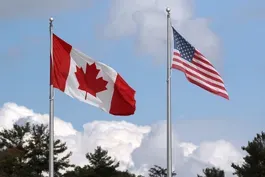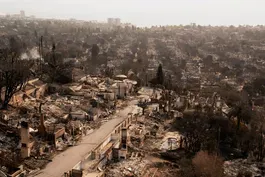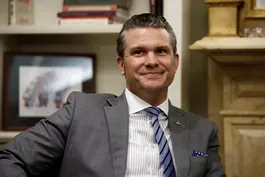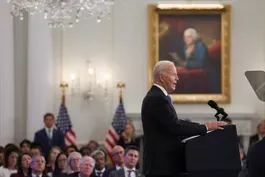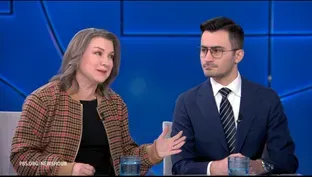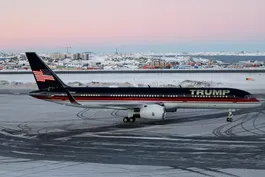
Roger Carstens reflects on bringing detained Americans home
Clip: 1/13/2025 | 7m 55sVideo has Closed Captions
Hostage negotiator Roger Carstens reflects on his efforts to bring detained Americans home
Roger Carstens' work over the last five years as the special envoy for hostage affairs has led to the release of American hostages held by other countries. He was also part of the team that negotiated Brittney Griner’s freedom and a complex deal that led to the release of Evan Gershkovich, Alsu Kurmasheva and Paul Whelan from Russia. Amna Nawaz sat down with Carstens to discuss his efforts.
Major corporate funding for the PBS News Hour is provided by BDO, BNSF, Consumer Cellular, American Cruise Lines, and Raymond James. Funding for the PBS NewsHour Weekend is provided by...

Roger Carstens reflects on bringing detained Americans home
Clip: 1/13/2025 | 7m 55sVideo has Closed Captions
Roger Carstens' work over the last five years as the special envoy for hostage affairs has led to the release of American hostages held by other countries. He was also part of the team that negotiated Brittney Griner’s freedom and a complex deal that led to the release of Evan Gershkovich, Alsu Kurmasheva and Paul Whelan from Russia. Amna Nawaz sat down with Carstens to discuss his efforts.
How to Watch PBS News Hour
PBS News Hour is available to stream on pbs.org and the free PBS App, available on iPhone, Apple TV, Android TV, Android smartphones, Amazon Fire TV, Amazon Fire Tablet, Roku, Samsung Smart TV, and Vizio.
Providing Support for PBS.org
Learn Moreabout PBS online sponsorshipAMNA NAWAZ: Roger Carstens work over the last five years as the special presidential envoy for hostage affairs has led to the release of a number of Americans held by countries like Venezuela and Iran.
He was also part of a team that negotiated Brittney Griner's freedom, as well as a complex multicountry deal that led to the release of Evan Gershkovich, Alsu Kurmasheva, and Paul Whelan from Russia.
Carstens is leaving his job in the coming days, and he joins us now.
Ambassador, welcome back.
Thanks for being here.
ROGER CARSTENS, U.S. Special Presidential Envoy for Hostage Affairs: Yes, thank you very much for having me.
AMNA NAWAZ: So, in the Middle East in particular, this is obviously a multiagency effort to not only negotiate a cease-fire, but secure the release of the hostages, including seven Americans, we understand.
The president said earlier today a deal is close, possibly this week.
Has either party, Israel or Hamas, taken this deal?
Do you see it happening this week?
ROGER CARSTENS: I think you always have to be optimistic in these cases.
You have to want to get to that end, and, hopefully, that informs the negotiation.
It's hard to tell whether these sides are going to narrow the gap that's been between them, in main part because we have been close before and have never been quite able to do it.
Obviously, we remain hopeful.
I have had a chance to talk to the families about this.
I mean, their hearts are breaking.
They can see how close the deal might be.
I was just in Israel last week meeting with my counterparts in the Israeli government, as well as other nations who have, I would say, entities like mine, SPEHA-like entities.
And we're all waiting, really just, like, I would almost say wringing our hands hoping this can get done.
And nothing would make me happier than to conclude this job watching people leave Gaza and come -- and going back to their homes.
AMNA NAWAZ: In these final days, though, we should point out, as the next administration comes in, how do you make sure that the incoming administration adheres to any deal that's made with this one?
I know your successor has been named.
Have you been in contact with him about this?
ROGER CARSTENS: You know, I have.
I have had many phone calls with him, exchanged messages and such.
I will have a chance to meet him in a day or two.
He's very well-informed.
He has, I would say, an extensive background in negotiations.
And I think he's going to do a fantastic job.
AMNA NAWAZ: We should know, by the way, that is Adam Boehler, I believe his name is.
ROGER CARSTENS: Boehler, yes, Adam Boehler.
AMNA NAWAZ: Boehler, yes.
He's a CEO of a health care investment firm Mr. Trump has named, yes.
ROGER CARSTENS: Adam Boehler.
AMNA NAWAZ: Yes.
ROGER CARSTENS: One thing, we're giving him a good team too.
Over the years, we have been able to build a good team at the State Department that handles these issues.
And he's going to be coming in and taking charge of that.
And I'm going to wish him the best.
And I will be always a phone call away if I can be helpful.
AMNA NAWAZ: Meanwhile, in a number of countries, we know Americans are still held, including in Afghanistan.
There are U.S. citizens being held by the Taliban government, a man named George Glezmann, and two men who we have interviewed here on the "News Hour," their families, Ryan Corbett and Mahmood Habibi.
You know, the president spoke with their families over the weekend.
And the Taliban, we understand, have been pushing for the release of a man named Muhammad Rahim al Afghani, who's held at Guantanamo Bay, described by U.S. officials as a senior aide to Osama bin Laden.
You were in Doha earlier this month.
Did you offer to the Taliban to release Rahim in exchange for freeing these three Americans?
ROGER CARSTENS: Well, Amna, I would love to tell you a little more about it.
But, to my mind, this is a negotiation that's in train.
It's still in motion.
In a perfect world, we will somehow be able to close the gap between us and the Taliban and I will be on a plane heading to another country to bring those Americans home.
Having said that, we're not there yet.
We're working on it.
But as far as the specifics go, it's best not to talk about it in public.
AMNA NAWAZ: Is there any deal in which you negotiate for less?
And they seem to be pushing for this one senior Afghan, Rahim, as I mentioned.
Is there any deal in which not all three Americans come home?
ROGER CARSTENS: Again, I wouldn't want to get into the specifics just because that negotiations, it's ongoing right now.
AMNA NAWAZ: Onto Syria.
I need to ask you about Austin Tice.
At the end of last year, you did travel yourself to Syria after the Assad regime had fallen, part of the effort to find him and hopefully bring Austin home.
He's a journalist who's been held there since 2012.
In the month-plus since the Assad regime has fallen, have you learned anything else about where he was held or where he might be?
ROGER CARSTENS: Let's say, in the run-up after Damascus fell on the 8th, we were able to find a lot more information.
We were also able to take information that we'd had for years and try to overlap it and overlay it to get a sense of where he might have been held.
I think we came up with a list of about six places that we believe Austin may have been held or had some sort of relation to.
And from probably the 8th of December until about the 20th, we were working with people on the ground who could in fact go to the prisons, the secret prison sites, and conduct investigations, look around, find paperwork.
We went, as you mentioned, on the 20th.
We had a chance to look at a jail cell that we believe had a high probability of having held Austin, filmed, looked for DNA samples, looked, recorded, gathered evidence, along with a wonderful team from the FBI.
And, right now, what we're doing is receiving tons of information from people on the ground that will eventually inform our search once we're able to put U.S. boots on the ground, hopefully, I would say, in the coming days or weeks.
AMNA NAWAZ: So U.S. officials are not on the ground right now?
You're relying on NGOs, media, other partners on the ground?
ROGER CARSTENS: Correct.
Correct.
AMNA NAWAZ: Is that right?
ROGER CARSTENS: Yes, that's correct.
Eventually, we're going to get the U.S. Embassy reopened, I would imagine, or we will have a chance to put some U.S. teams, hopefully from the FBI, to work with the interim government in conducting these searches.
But other than the visit that we had on the 20th and one or two other visits that have taken place after that, we just don't have an enduring presence to conduct the search.
AMNA NAWAZ: I mean, you take a step back and look at the work you have led over the last five years, I know the State Department just put out this plan about how to reduce the risk of U.S. citizens being detained overseas.
ROGER CARSTENS: Yes.
AMNA NAWAZ: There's a line in there that stood out to me.
It said: We want to deter and prevent wrongful detention by raising the cost for those states involved."
You have seen, as well as I have, this recent reporting from The Wall Street Journal about how the Venezuelan regime, Nicolas Maduro, has actually been ramping up his detention of a number of foreign nationals, including American citizens, some 50 foreigners since July.
It seems like leaders are taking away the opposite lesson, that they're incentivized to hold hostage American nationals.
How do you impose a cost to deter that from happening?
ROGER CARSTENS: First off, let me gently push back on your assertion.
I'd say the data does not back up that some of the deals that we have had to make to bring Americans home is actually increasing the amount of people that nation-states are taking hostage.
Maduro might be a notable exception, but for the most part, our numbers have been as high as 74.
They have gone down to a very small number at this point.
But in terms of raising the costs, if you can, I would say, number one, build a multilateral coalition that can work together to impose costs, to share information, to, I would say, enact preventative measures, then that's a good step.
Secondly, we want to, I guess, expand the U.S. toolkit.
We have always been very quick to use diplomacy in terms of our national elements of power, but there are other tools out there that we need to create and, I would say, strengthen, and that could be across the information space, economic, financial, legal.
There are other tools out there that we're going to be growing to build just kind of -- I guess, put the lid on this horrific -- this action.
But we're also working with our multilateral partners to do that as well.
And, additionally, we're trying to create partnerships that will allow us to warn people from doing this.
And that's with the private sector and with nongovernmental sources as well.
And, lastly, we're working on strengthening legal norms so that eventually we have like an ecosystem of organizations, government and nongovernment, that can create the mechanisms that will one day put this to rest.
AMNA NAWAZ: Ambassador Roger Carstens, the now outgoing special presidential envoy for hostage affairs, thank you so much for joining us here at the "News Hour."
ROGER CARSTENS: Very grateful for being here tonight.
Thank you.
Ambassador says Canada prepared for any scenario with Trump
Video has Closed Captions
Canadian ambassador to U.S. on tensions with Trump: 'We are prepared for any scenario' (6m 22s)
Dangerous winds pick up as crews battle devastating LA fires
Video has Closed Captions
Dangerous winds pick up as crews continue to battle devastating LA-area fires (9m 46s)
Hegseth hearings to begin amid sexual misconduct accusations
Video has Closed Captions
Hegseth confirmation hearings to begin amid sexual misconduct accusations (7m 20s)
News Wrap: Biden defends legacy on world stage in address
Video has Closed Captions
News Wrap: Biden defends legacy on world stage in address at State Department (5m 37s)
Tamara Keith and Andrew Desiderio on wildfire politicization
Video has Closed Captions
Tamara Keith and Andrew Desiderio on the politicization of the California wildfires (8m 18s)
What makes Greenland a strategic polar outpost
Video has Closed Captions
Why Trump wants Greenland and what makes it a strategic polar outpost (6m 24s)
Providing Support for PBS.org
Learn Moreabout PBS online sponsorshipMajor corporate funding for the PBS News Hour is provided by BDO, BNSF, Consumer Cellular, American Cruise Lines, and Raymond James. Funding for the PBS NewsHour Weekend is provided by...

